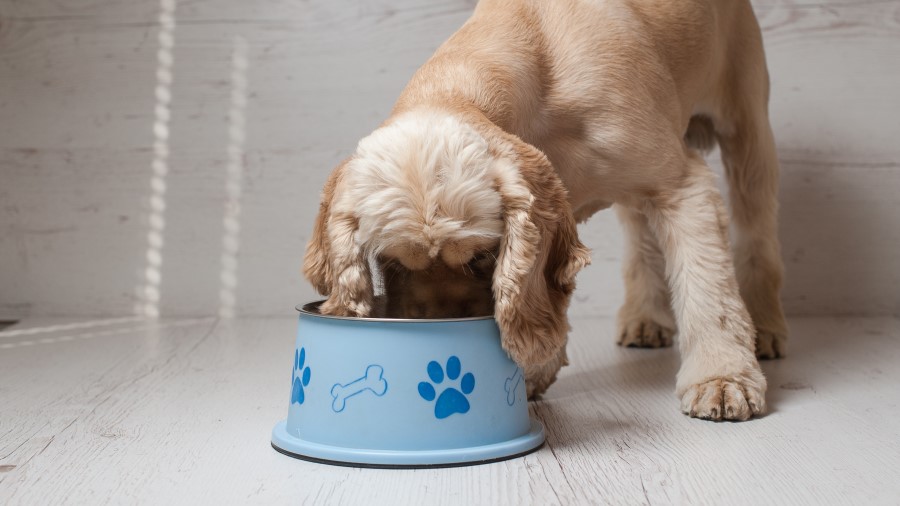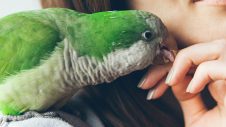Puppies have many different requirements in their dietary needs, compared to adult dogs, as not only do they need maintenance nutrition to support their crazy puppy lifestyles, they need higher ratios and quantities of certain vitamins and minerals to support growth and development of their little bodies, plus they have higher calorie needs and faster metabolisms.
Breed & Energy Requirements For Your Puppy
All puppies need extra considerations for growth, but with the great variety in size of different dog breeds, there are specific requirements amongst different breeds also that must be met to allow the best development. Large breeds grow far faster than small breeds so providing them with additional joint support and essential omega 3s and 6s are factored into their diets. In general, it is recommended to feed puppies a breed appropriate puppy food till they reach ~1year old, as this is the average time their skeletons take to fully develop, and they can then be transitioned onto a breed appropriate adult formula.
Certain breeds such as large and giant breeds (E.g, German shepherds, Great Danes and Irish Wolfhounds) can take longer for their skeletons to fully develop, so in general it is recommended to continue puppy food till these dogs are closer to 1 and a half years old.
Without a breed/size appropriate puppy formulated diet pups are far more susceptible to joint and limb deformities, poor growth including ligament and muscular issues can even affect their general health and immune system.

Nutritional Considerations For Your Puppy
Commercial puppy foods are formulated to mimic your pup’s natural diet and provide the precise balance of protein, carbohydrates, fats, vitamin and mineral requirements that your pup requires.
Commercially balanced food comes in both wet and dry versions. Whether you choose wet or dry is a matter of preference for you and your pup. There are many forms including dog rolls, canned food and frozen raw complete meals for example. It is worth noting that dry food can be helpful to maintain dental health and though we recommend additional care to help with teeth regardless, they will need even more care required to maintain dental care if they are on a 100% wet diet as there is no resistance or abrasive chewing action required, so plaque and tartar builds up fast.
Often a mixed diet works best, providing variety, with many people opting for a predominantly dry diet with some wet food and training treats, dental chews and such added in.
Your puppy does not need any additional home-cooking or meat on top of these balanced diets, as they contain everything your little one needs. Once your puppy is an adult, if you would like to home cook, there are balanced options out there such as “Project Nosh”, available at Petbarn, which provides recipes and supplements to add to home cooked food to make sure it is complete and balanced, however there is no puppy formula available at this stage.
For more information about selecting the right option for your pup, check out our article on how to pick the perfect food for your new puppy.
Digestibility of Puppy Food
A high-quality diet is always best, as poorer quality diets often are higher in salt, carbohydrates and poorly digestible components, so even though they do meet the minimum requirements needed to provide nutrition, the extras in them can contribute to weight gain, gut upsets and other issues.
Better quality foods are more easily absorbed by your pup’s digestive system, as they contain less “fillers”, so more of the food volume is high quality and digestible. This means better nutrition for your pup and less amount of stool (plus generally less smelly stool).
Lower quality diets are not so easily digested and so provide less nutrition, and more volume and frequency of stool.
How Much to Feed Your Puppy
Most commercial puppy foods will have a feeding guide. Start with the suggested daily amount for your pet’s weight and age. This is a “guide”, and every pup is different in their energy requirements, metabolism and activity levels, so it is an important starting point, but once you start feeding you should gauge your pups hunger levels and their body condition to determine whether you should be feeding more or less than the guide suggests.
Am I Feeding My Puppy the Right Amount?
Use your pup’s condition to determine whether they are getting sufficient intake. Use the appearance of your pup’s waist and ribs as a simple indicator of body condition.
If your pup’s ribs are visible to the eye at any stage, this indicates they are too lean, so please increase the food intake. If your pup’s waist is filling out and they have a thick fat layer over their ribs, this can indicate more body fat than normal, so reduce the food intake a little and monitor.
For growing pups, it is good to have a thin layer of fat overlying their ribs and a slight waistline, but they don’t generally have as obvious a waistline as adult dogs do. They grow constantly and have growth spurts intermittently also, so never expect them to be very lean like an adult. Having a little extra is helpful to allow room for growth but being too lean/skinny can result in them growing more poorly and not reaching their full potential for growth and being too overweight can cause excess strain on their developing muscles and ligaments, which can cause issues like ligament weakness and poor muscle development. A good balance is important and if you are ever unsure about what is an optimal condition, please discuss your pup’s weight and condition with your vet.

How Often Should I Feed My Puppy?
It is important to be aware that puppies have a higher metabolic rate than adult dogs, so they need to eat more frequently and are at a higher risk of getting low blood sugar when they don’t eat for an extended period of time. It is recommended to feed a puppy on average three times daily till they are ~4-6months old, depending on the breed. After this you can reduce to twice a day feeding but it is often good to incorporate a smaller midday feed in food/puzzle toys or part of training to help with mental stimulation. Once a day feeding can be done when dogs are fully grown however it is not recommended as there can be higher risks of issues such as bloat/gastric dilation volvulus (GDV), behavioural problems associated with food guarding, weight gain, as more frequent feeding is in general better for metabolism and gut health, so twice a day feeding as optimal feeding frequency ongoing.
How To Pick Puppy Food For Your New Puppy
Choosing the correct puppy food for your new family member can be overwhelming! There are so many diets available, how do you choose one that is nutritionally sound?
Puppies need to eat a diet that meets their specific needs until they are at least 12 months old. Large breed dogs need puppy diets until 15 months, while giant breeds until 18 months of age. This first 12-18 months is a critical period in your puppy’s life, so you’ll want to make sure you’re feeding the best possible diet.
Here is a list of considerations to help you make an informed choice:
- Does the manufacturer meet the World Small Animal Veterinary Association Guidelines on Selecting Pet Foods? These guidelines provide food for thought!
- Check that the food is nutritionally complete and balanced. This means it is designed to meet all the Association of American Feed Control Officials (AAFCO) minimum levels for growing puppies. Many brands state that they meet AAFCO standards on their labelling.
- Has this puppy diet undergone feeding trials? Can you easily request the research information from the manufacturer?
- Is the diet made ‘for’ the company by a third party or ‘by’ the company?
- Has the diet been manufactured by an animal/veterinary nutritionist or is this a breeder/trainer formulated diet?
- Consider the size of your puppy. Puppies expected to grow to over 25 kilograms need to be fed a ‘large breed puppy’ diet. These foods are designed to have a lower calcium level and usually are lower in calories than typical puppy foods, so that we can avoid rapid growth. Rapid growth may stress developing bones and joints, which can contribute to ongoing joint problems.
- Do you want to feed dry food or tinned/wet food? Or a combination of both?
- What size is the kibble? Breeds such as brachycephalics (short nosed breeds) may find it easier to eat smaller sized kibble.
- Does you puppy have any medical issues? Puppies born with heart, kidney or liver problems may need a special therapeutic diet. Your veterinarian will be able to help you choose an appropriate diet.
Other points to remember:
- Often pet owners are keen to see a specific nutrient in a diet, such as protein. Puppy foods made by reputable manufacturers, based on strong nutritional expertise and excellent quality control, will have the right levels of nutrients for healthy puppies, so you don’t need to worry about identifying one specific nutrient for your pup.
- It is worth noting that desexing/neutering you puppy will reduce his or her caloric needs by about 30%. You will need to adjust your feeding quantities accordingly to avoid obesity.
- The costs of a diet and the nutritional value do not necessarily align! Don’t forget that marketing is a powerful tool.
- Until the specific cause of diet-associated dilated cardiomyopathy (DCM) is fully understood, some owners may wish to avoid peas, lentils, chickpeas, potatoes, and sweet potatoes. These diets are often marketed as ‘grain free’.
Training & Additional Puppy Feeding
Training is a crucial part of raising a puppy and providing adequate mental and physical stimulation is often assisted by using treats. It is important to remember when working out your puppy’s daily needs that treats are in addition to their normal food, so if you are doing lots of work and training with them or giving them lots of food based puzzle toys you should include these when working out their daily food requirements. You can feed a bit less puppy food to compensate for treats or better yet can use their normal puppy food for training purposes, so for example you could split their daily food requirements into 3 portions and feed breakfast and dinner, then their midday meal split over the day in training and toys, so you are not going well over their daily requirements.

 Greencross Vets
Greencross Vets 








